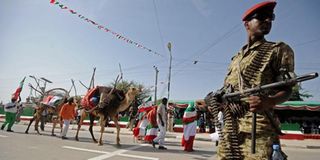210 civilians killed in 24 days of Somaliland clashes

In this photo taken on May 18, 2016, a soldier of the army of Somalia's breakaway territory of Somaliland stands guard during an Independence day celebration parade in Hargeisa.
Mogadishu,
More than 200 people lost their lives over 24 days of clashes between security forces and clans in a disputed part of Somalia's breakaway Somaliland region, an official said on Thursday.
"210 civilians were killed and 680 others were wounded in the fighting, which broke out between Somaliland forces and the local community in Las Anod," the mayor of the contested town, Abdirahim Ali Ismail, told a press conference.
"The fighting started on the 6th of February 2023 and continued for 24 days," he said, adding that 200,000 families had fled from their homes following the clashes.
Somaliland, which has claimed independence from Somalia since 1991 but has never been recognised internationally, is usually seen as a beacon of stability in a chaotic region.
Political tensions, however, have surged in recent months, leading to deadly violence between Somaliland's forces and militias loyal to Somalia.
Las Anod straddles a key trade route and is claimed by both Somaliland and neighbouring Puntland, a semi-autonomous state of northeastern Somalia.
The violence erupted after elders in the Sool region, where Las Anod is located, issued a statement pledging support for Somalia's federal government and urged Somaliland authorities to withdraw their soldiers from the area.
The fighting has caused widespread damage across the town, including to its electricity and water supply, said Ismail.
"715 homes were destroyed and 16,000 businesses closed, the water was cut and the troops forcibly stormed the... electricity company which provided light to the town," he said.
"All government institutions have been bombed, the main hospital was bombed including the blood bank department and the intensive care unit," he added.
Local resident Hassan Sahal described Las Anod as "a war zone" with just a "few families" left. "If the fighting continues, I don't think people other than those fighting will stay in the town," he told AFP.
"The situation is not getting any better so far," added Ahmed Warsame, another resident who fled the town during the first week of clashes and returned to look after his home.
According to a UN statement released last month, more than 185,000 people have been displaced by the violence, including over 60,000 civilians who have fled to Ethiopia's Somali region.
'Desperate situation'
Medical charity Doctors Without Borders (MSF) said one of the hospitals it supports was hit for the fourth time in three weeks on Tuesday.
It "brought a stop to activities in the paediatrics ward and blood bank... now the needed blood supply is no longer available for the newly-arrived wounded," Djoen Besselink, MSF country representative for Somalia and Somaliland, said in a statement on Wednesday.
"What we are witnessing today is a desperate situation where the human suffering of the violence is tremendous -- displacing people from their homes and making them fear for their lives," he added.
Somaliland authorities announced a ceasefire on February 10, but days later accused Somalia of attacking its forces.
The fighting has worried the international community, with Qatar, Turkey, the United Arab Emirates, Britain, and the United States among the countries urging an end to the violence in a joint statement released on Tuesday.
"The partners expressed concern about the ongoing conflict... and called on all parties to adhere to the ceasefire, de-escalate, allow unhindered humanitarian access, and engage in constructive and peaceful dialogue," the statement said.
UN rights chief Volker Turk last month called on authorities to conduct a "credible and impartial investigation" into the clashes and warned that they compounded the already fragile humanitarian situation in the region.
Somaliland, a region of 4.5 million people, is a former British protectorate.
It prints its own currency, issues its own passports and elects its own government but its quest for statehood has gone unrecognised, leaving it poor and isolated.
However, the region has been relatively stable in comparison to Somalia, which has witnessed decades of civil war and Islamist insurgency.





